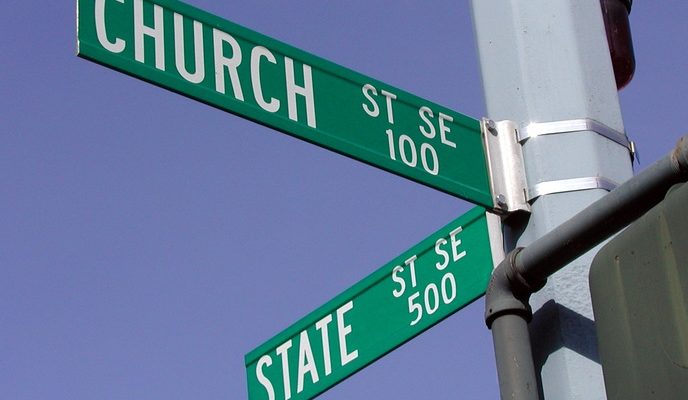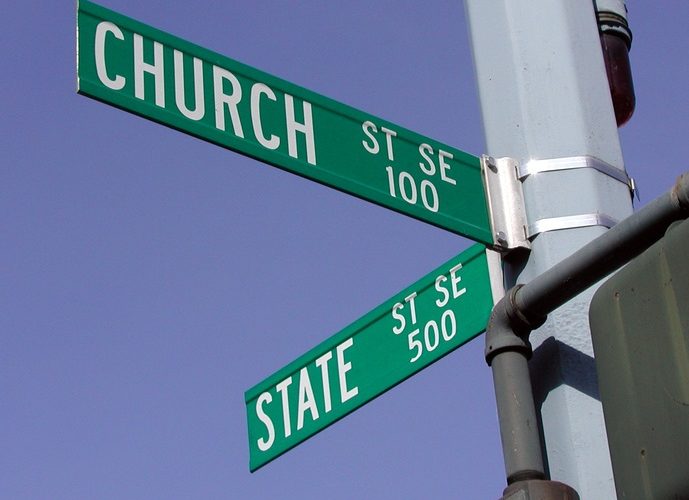Most Americans support the principle of church-state separation, but fascination about their merger exists among minorities of some political, religious and ethnic groups, the Pew Research Center has documented.
Pew’ latest American Trends Panel revealed 55% of U.S. adults favor the Constitutional delineation between faith and government. The First Amendment prohibits government from “establishment” of religion but protects the “free exercise” of religion — a line of demarcation that has become the midpoint of a U.S. cultural and political tug-of-war.
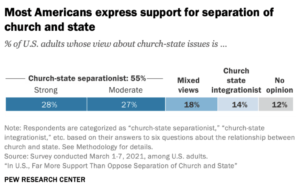 “This includes 28% who express a strong church-state separationist perspective and an additional 27% who express more moderate support for the church-state separationist perspective,” Pew said in an online summary of the research conducted during the first week of March 2021. “By contrast, roughly one-in-seven U.S. adults (14%) express support for a ‘church-state integrationist’ perspective as measured by the survey.”
“This includes 28% who express a strong church-state separationist perspective and an additional 27% who express more moderate support for the church-state separationist perspective,” Pew said in an online summary of the research conducted during the first week of March 2021. “By contrast, roughly one-in-seven U.S. adults (14%) express support for a ‘church-state integrationist’ perspective as measured by the survey.”
Just under 18% of the 12,055 U.S. adults surveyed expressed mixed views on the issue, while one-in-eight had no opinion, Pew said.
“The survey shows, furthermore, that even in the groups that tend to express the most support for the intermingling of church and state, the ‘church-state integrationist’ perspective is the exception, not the norm,” Pew’s report noted.
Yet the undercurrent of support for merging faith and government transcended several demographics.
“Some Americans clearly long for a more avowedly religious and explicitly Christian country … with three-in-10 preferring that public school teachers should be allowed to lead students in Christian prayers, a practice that the Supreme Court has ruled unconstitutional,” Pew said. “Roughly one-in-five say that the federal government should stop enforcing the separation of church and state (19%) and that the U.S. Constitution was inspired by God (18%). And 15% go as far as to say the federal government should declare the U.S. a Christian nation.”
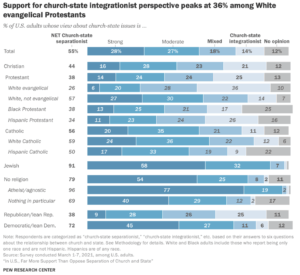 Christians were more likely than other religious groups to state a preference for merging church and state, the survey revealed. “In addition, Christians who are highly religious are especially likely to say, for example, that the Constitution was inspired by God,” the report said.
Christians were more likely than other religious groups to state a preference for merging church and state, the survey revealed. “In addition, Christians who are highly religious are especially likely to say, for example, that the Constitution was inspired by God,” the report said.
White evangelical Protestants stood out in that respect, with 36% preferring to see government and faith integrated, while 28% had mixed views on the subject. Only 26% of white evangelicals said church and state should be separate.
Partisan affiliation predictably mirrored the trend, Pew added. Republicans expressed higher levels of approval for church-state integration than Democrats and those who lean Democratic. Even so, that support reflected the minority, overall.
“For the most part, Republicans do not directly voice a preference for the integration of church and state,” the report said. “For instance, 58% of Republicans and Republican leaners say the federal government should never declare any religion as the official religion of the United States, while a quarter of Republicans (26%) say that the government should declare the U.S. a Christian nation.”
In contrast, 80% of Democrats oppose the establishment of a state religion, while only 6% prefer that option.
Results from the research included support for blurring faith and state among some ethnic and racial groups, Pew said.
“For example, many Black and Hispanic Americans — groups that are heavily Democratic — are highly religious Christians, and on several of the questions in the survey, they are just as likely as White Americans, if not more likely, to say they see a special link between Christianity and America,” the report indicated.
Close to 38% of African Americans said public school teachers should lead their students in Christian prayer, compared to 31% of white Christians who favored that practice.
“And about one-in-five U.S. Hispanics (22%) say the federal government should stop enforcing the separation of church and state, roughly on par with the 19% of White Americans who say this,” Pew reported.
The survey also detected commonalities between Americans’ views on church-state separation and the rise of Christian nationalism.
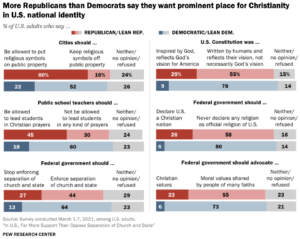 “People who favor church-state integration are mostly Republicans and Republican leaners, think Trump was a ‘good’ or ‘great’ president, say the growing numbers of immigrants in the U.S. threaten traditional American values, and feel that society would be better off if more people prioritized getting married and having children,” Pew said.
“People who favor church-state integration are mostly Republicans and Republican leaners, think Trump was a ‘good’ or ‘great’ president, say the growing numbers of immigrants in the U.S. threaten traditional American values, and feel that society would be better off if more people prioritized getting married and having children,” Pew said.
“Church-state integrationists are far more inclined than church-state separationists to say that it is ‘no more difficult’ to be Black than White in American society (42% vs. 13%), and that the U.S. ‘stands above’ all other countries (40% vs. 15%).”
Conversely, “most people who support separation of church and state are Democrats or lean toward the Democratic Party, think Donald Trump was a ‘poor’ or ‘terrible’ president, say immigrants strengthen American society, and reject the notion that society is better off if people prioritize getting married and having children,” the survey found.
Those who identified with Democratic values also viewed race and nationalism differently from conservatives, Pew said.
“More than half of people with a church-state separationist perspective say it is ‘a lot’ more difficult to be a Black person than a White person in the U.S., and that while the U.S. is one of the greatest countries in the world, there are other countries that are also great,” the report noted.
Related articles:
Survey paints scary, hopeful picture of U.S. political divide / News, Jeff Brumley
New surveys connect the dots between politics, race, religion and vaccination / News, Jeff Brumley
Americans are deeply divided over the need for racial healing and how to talk about the nation’s past / News, Jeff Brumley

